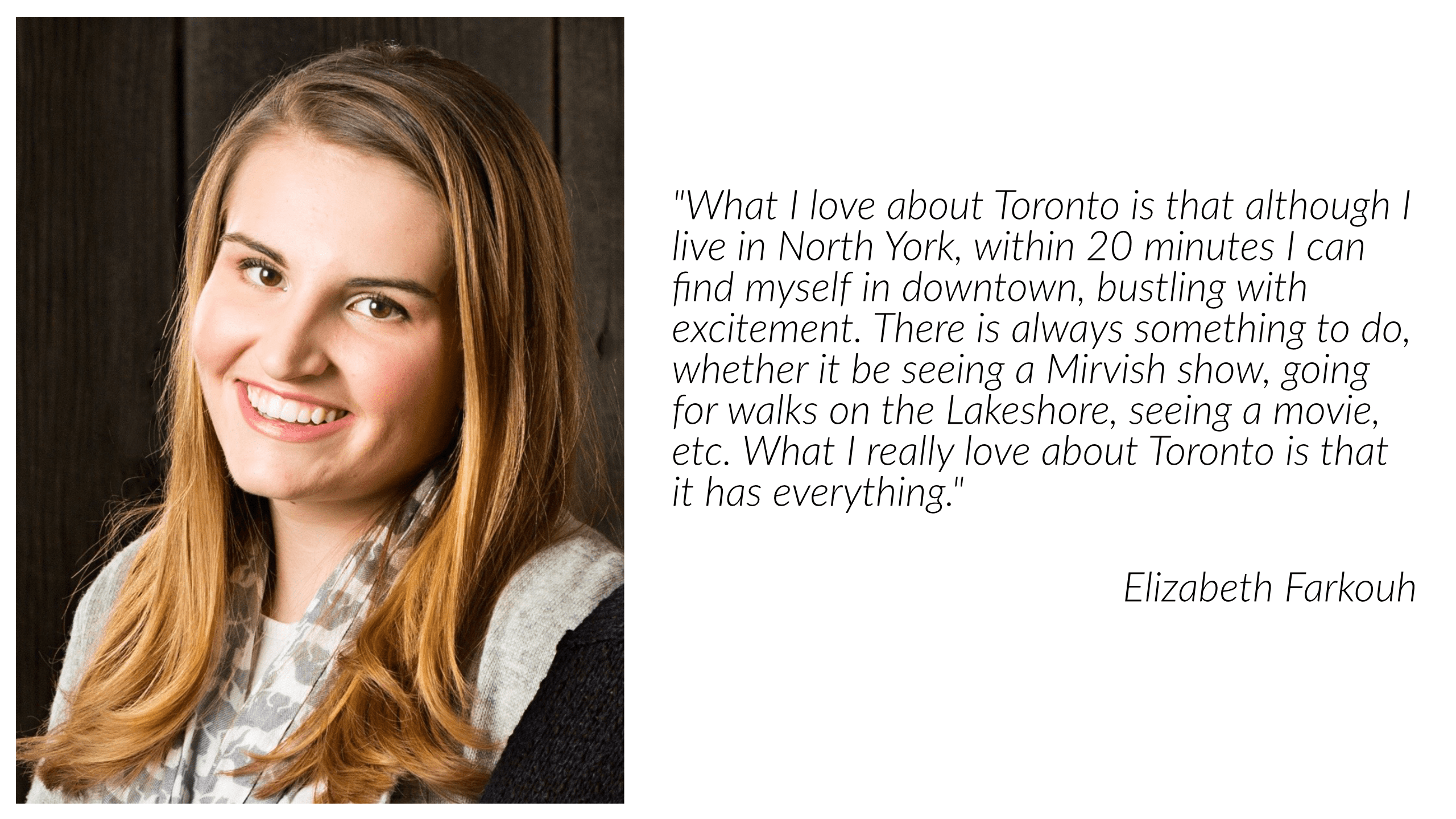It’s not every day that you run into a teenager trying to add more material to her school’s curriculum, but that’s exactly what Elizabeth Farkouh has been doing for the last four years.
Farkouh came to Canada in 2008, when she and her family moved from New York to the Yonge-Lawrence area of Toronto. Enrolled in Havergal College (one of the oldest all-girl private schools in Canada), Farkouh became interested in the phenomenon of under-age drinking and eventually convinced her school to add more information about the negative effects of drinking alcohol to their health studies curriculum.
Although she has now graduated from grade 12, and is preparing to study Global and Public Health Sciences at New York’s Cornell University, Farkouh is still deeply concerned about alcohol miss-use by adolescents. She even joined the Alcohol Working Group – an offshoot of the Toronto Cancer Prevention Coalition and was quite willing to interrupt her summer cottage vacation to share her thoughts for Torontoism.
How did Toronto seem to you when you first got here from New York? How has this impression changed over the years?
I was born and raised in NYC, so coming to Toronto (and especially my North York area) was a big change. It was calmer, and there was a really big sense of community. What I love about Toronto is that although I live in North York, within 20 minutes I can find myself in downtown, bustling with excitement. There is always something to do, whether it be seeing a Mirvish show, going for walks on the Lakeshore, seeing a movie, etc. What I really love about Toronto is that it has everything.
Havergal is a pretty old and prestigious school. What made you choose to go there, and what was it like being a student once you got there?
My mom actually attended Havergal, so once I got in, it was a no brainer. Havergal is an amazing school. What I loved most about Havergal is that they allow you (and want you) to explore all of your passions, and they will support you along the way. In other words, I didn’t have to pick academics or sports or arts – I could do all of them. Moreover, every aspect of the school had a supportive department/faculty. My science classes taught me so much about critical thinking and analysis, and my co-curricular involvement with theatre made me more creative and engaged in school life.
Have you always been interested in health?
I probably have always been interested in health – from a young age, because my parents are both doctors, so they taught me the importance of maintaining good health. And of course my parents raised me in a household where drinking wasn’t acceptable, smoking wasn’t acceptable, so I was always raised in a household where we were taught to make good decisions.
How did you become interested in the underage drinking phenomenon?
In middle school – grade seven and eight – I hadn’t really heard about drinking at my age. Nobody really talked about it – perhaps it did go on, but nobody really discussed it in any way. But in grade nine I noticed that quite a few of my peers started to talk about drinking, and maybe talked about parties they were at where they had seen alcohol or maybe even taken part in drinking alcohol themselves, and that’s when I kind of started to be exposed to this issue.
And I was just curious, so I googled it and found an article that read ‘Underage binge drinking is the number 1 risk factor for developing early-onset dementia’. That was something that I’d never really heard about and that’s when I really became specifically interested in alcohol, and alcohol issues regarding youth.
So after learning a bit and becoming concerned, what did you do?
The first thing that I did was put up anonymous posters around my school. It was basically a picture of one brain of a fifteen-year-old male non-drinker, and then a fifteen-year-old male heavy drinker. And you could actually see how the brain activity is greatly decreased in the heavy drinker – and this is done while they were sober, so the effects are long-lasting. So I put a picture of these two brains up in bathroom stalls, I put it in the locker room, areas where students could just take it in, it wasn’t in a classroom environment, so they weren’t busy learning something else, it was just something in their own space that they could take in.
I didn’t have my name on them, because I just wanted to start a dialogue about it, and I didn’t want it to be about me in any way. I just wanted them to take the information for what it was. And then after that, we had an assembly at school, so I gave a presentation to around 600 people about the issue. So that was kind of nerve-wracking. And that’s when I attached my name to what I had done.
What was the response to the posters and the presentation?
I was actually expecting the response to be quite negative because drinking is something that quite a few teenagers do, but it was actually overwhelmingly positive for the most part. And I had a few friends tell me that they were really proud of me and that it took courage to do this, and they were really appreciative of the fact that I was sharing this information. A lot of people were really appreciative.
There was some negative response. A few people said that perhaps it wasn’t true, or the information wasn’t real, but you know, I think that’s probably just a defense mechanism or just people who don’t want to believe it, which is fine, you know. There’s always going to be a negative response to things.
You also managed to get a bit more information about alcohol and its effects into the health curriculum.
I went to the Director of Curriculum at my school, and I spoke with her, and she put me in touch with the head of the physical education department at my school. Then I created a lesson plan for grade eight students on underage drinking. And after that, I met with the physical education department of the junior school and they allowed me to give a presentation to grade six students at the end of the year.
But hopefully, I’ll be able to establish an actual lesson plan that teachers can use for the future. And my hope down the road is that this will eventually be in the provincial curriculum, but obviously, that’s a long way away.
Can you tell me more about what you added to the grade eight curriculum?
So now they’re teaching the grade eight students, that drinking damages the developing brain. For example, the hippocampus is the brain structure which is responsible for memory, and it’s actually ten percent smaller in underage binge drinkers. They’re taught that it reduces their memory, their learning and comprehension.
Also, the developing brain is more susceptible to addiction, so they’re now learning that – for example – if you start drinking at age 13, your chances of developing alcohol dependence are so much higher than if you start drinking at age 21.
Is there more you’d like to add?
I’m trying to put in the cancer component; that alcohol is a carcinogen. Because we learn from a young age that tobacco causes lung cancer, but we don’t really hear about the effects of alcohol as a carcinogen. That’s just not something that’s really talked about in the health curriculum.
Given all of the different causes one could become concerned with, why do you think this one resonated so much with you?
Almost everybody knows the risks associated with smoking, but alcohol is something that most people don’t know. I mean, you see cancer organizations will host fundraisers that say, literally, ‘raise a glass to conquer cancer’. Alcohol and cancer, and alcohol and the developing brain, is just something that I think a lot of people don’t know and don’t understand. And that’s why I’m so passionate about it.
Now that you’ve graduated, are you doing anything else about under-age drinking?
I’m still a member of the Alcohol Working Group, which works to educate people about the carcinogenic effect of alcohol. But I’ve just been kind of sitting on this and thinking about it. Just exploring the ideas and seeing how I can pursue this further.
I’m currently looking into a program called Alcohol EDU, which is an online interactive educational program regarding alcohol. And I want to contact them to ensure that they have the information about carcinogenic effect of alcohol in their program, and also about the effect of alcohol on the developing brain, because this is a program that’s sent out to many high-school students and a lot of colleges in the States.
Are you thinking of pursuing any other alcohol-related issues besides education?
One thing I’d kind of like to open up the discussion about is actually when the legal drinking age is. Because the brain isn’t actually fully developed until age 25. So theoretically, the legal drinking age should be 25, but that’s kind of unrealistic. But you know, if we were even able to put it to 21, that would just prevent a lot of damage to the developing brain, and it’s actually been proven that in countries like the States with a higher drinking age, people actually do drink later, and that reduces public health problems in many ways.
I also think it’s interesting that tobacco advertising is completely illegal, but alcohol advertising is everywhere. And you know, kids are exposed to alcohol advertising almost every day. And I’m interested in how alcohol is portrayed in films that are available – for example, not rated R – but are available to teenagers and to children, and how alcohol is portrayed in these films, because often it’s glamorized, and this is shown to kids who aren’t even at the legal age yet. So I find that really interesting too, and that’s something I want to pursue.




